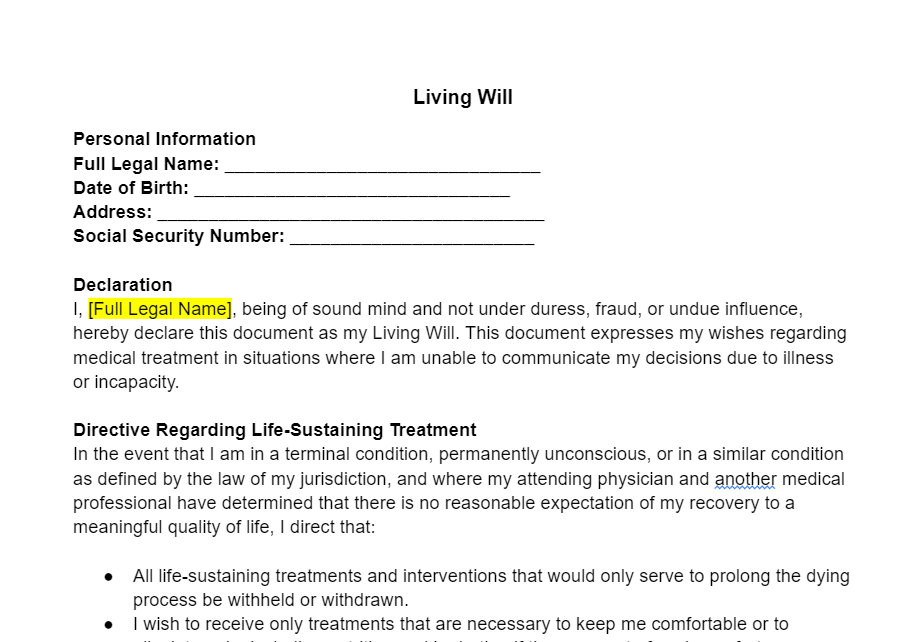
Living Will Template
6 Downloads
Family and Inheritance
December 23, 2024
Sayantani Dutta
The Living Will tells the medical team your wishes surrounding the treatments they can offer you when you’re incapacitated and can’t approve their recommendations. The Living Will discusses your healthcare wishes surrounding the use of the following medical treatments when you’re unable to communicate these wishes to the medical team in charge of your healthcare.
- Assisted ventilation
- Cardiopulmonary resuscitation (CPR)
- Surgery
- Dialysis
- Antibiotic administration
- Artificial nutrition
- Chemotherapy
The Living Will may also instruct the medical team on your wishes for the use of treatments designed to relieve pain and make you feel more comfortable in the end stages of a terminal disease. You can authorize the use of these treatments even if they could present life-threatening complications.
The Proxy Directive names the person who’s responsible for executing the Living Will. Usually, you’ll assign family members to the proxy role, or in some cases, a legal professional oversees the execution of the Living Will as its proxy. The Instruction Directive outlines the end-of-life medical treatments you do or don’t want if you’re unable to authorize them yourself.
Are there Any Limitations to Living Wills?
Despite the Living Will being a foundational document in your estate planning, with many benefits to you and your family, it’s not without its limitations.
Lack of Medical Context and Knowledge
The Living Will requires a person with no medical background to make decisions on their medical health, usually without undertaking medical advice. This gap in context results in a disconnect between Living Wills, medical decision-making, and treatment preferences.
Misinterpretation and Imprecision
The person forming the Living Will might not use proper medical terms when describing their treatment preferences. The average person doesn’t know what they’re talking about when it comes to defining medical care, leading to confusion in complex medical decision-making scenarios.
Lack of Enforceability
The Living Will is a legally binding document in every state except Michigan, Massachusetts, and New York. The healthcare provider is legally obligated to follow your request for treatment and medical decisions. If the healthcare provider refuses, they must transfer you to another that will follow your wishes. The Living Will is a legal document, but if no one knows you have one or where to find it, they can’t hand it over to the proxy to execute your wishes.
How to Prepare a Living Will
The Living Will outlines your wishes for medical care when you’re in a critical condition. Those decisions affect not only your treatment and patient outcome but the mental health of your loved ones as well. You must prepare the living will properly for it to carry legal weight when you need it. It must be dated and signed by you or under your direction with two witnesses present.
You can get the document notarized by a notary public in your county or an attorney at law. They will attest to you being of sound mind and free of undue influence and duress at the time of signing the Living Will.
When Does the Living Will Come Into Effect?
Medical care providers at a health care facility look to a patient’s wishes in their living will when the patient is in a terminal condition, and their treatment is experimental. Or if the patient is in a persistent unconscious state or their treatment is simply to delay the process of dying.
Withholding or withdrawing a patient’s treatment must outweigh the benefits of the patient not receiving it. If the treatment won’t cure them and only prolongs dying, imposing treatment is considered inhumane.
What Are the DNR and POLST?
The “Do Not Resuscitate Order” (DNR) and “Physician’s Orders for Life-Sustaining Treatment” (POLST or MOLST) discuss a patient’s healthcare wishes for end-of-life treatments when suffering from a terminal disease.
These one-page forms are brightly-colored and carry instructions for emergency medical personnel to avoid providing CPR or life-sustaining treatments. The goal of the DNR and POLST is to allow a person with a terminal condition to die without the medical team working to prolong their life.
Both are physicians’ orders and are usually only available for seriously sick or frail individuals. The Living Will states the patient’s preferences regarding their future non-emergency medical decisions of withdrawing life-sustaining medical treatment. Anyone of any age or any stage of health can form a Living Will and Advance Directive.
Understanding Health Care Power of Attorney
The Health Care Power of Attorney is different from the healthcare Proxy Directive we discussed earlier. It also goes by the “Durable Power of Attorney for Health Care (DPOA).” This power of attorney authorizes a healthcare agent to access your medical records, make medical and healthcare decisions on your behalf, and communicate with your healthcare provider. The HCPOA will not overrule the Living Will.
The agent can’t make specific decisions regarding the withdrawal of life-saving or life-sustaining medical treatments unless two physicians confirm you are in a persistent coma or vegetative state or you’re in th end-stage of a terminal illness.
The agent can’t withdraw treatments you previously consented to unless it’s no longer achieving its desired purpose. They also can’t order doctors to withdraw treatments intended to relieve pain or provide comfort care.
The agent acting on behalf of a pregnant individual can’t refuse or withdraw treatments if it would end the pregnancy. The only exception to this rule is if two consulting doctors state the fetus doesn’t have any chance of surviving.
Executing and Revoking an Advance Directive
The Living Will won’t come into effect unless you have an agent who knows about it and knows where to find it. Since the document only comes into play when you’re incapacitated, it’s a good idea to let your healthcare agent or family members know where you keep it.
You can always change your mind if you’re still conscious and of sound mind. You can change the instructions in your living will at any time up until its execution. If you change your wishes, let your proxy know.
An Advance Directive must be revoked via notification to the attending physician, nurse, health care professional, health care representative, or reliable witness. Notification can be in writing, delivered orally, or by any act showing intent to revoke the Living Will.
How Often Should I Update My Living Will?
Review the life care and health care wishes in your Living Will every two to three years if you’re currently healthy. If you experience a sudden change in your health, relationships, finances, or medical care, consider updating your living will to reflect these changes. The laws surrounding health care decisions and the use of medical technology in critical care situations are constantly changing, and so should your wishes in your Living Will.
Download a Free Living Will Template at FreshDox
Take action now and download a customizable Living Will template from FreshDox with a free 7-day trial. Our platform lets you edit and download your Living Will, giving you the ability to update it whenever you want. We have all the directive forms for your Living Will, proxy directive, and instruction directive. Sign up for a Premium or Basic account and browse our selection of estate planning documents.
Related Templates
Discover more templates that align with your needs and preferences.

Ready to Sign Up?
Sign up for FreshDox.com’s 7-day trial and discover why so many individuals and businesses trust us for their legal document template needs.
- Cancel any time
- 7-day free trial
- From 300+ Customer Reviews
















